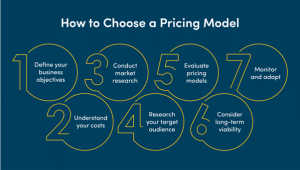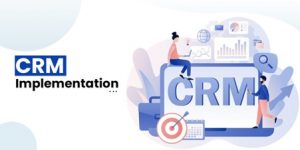

In the modern business landscape, managing customer relationships isn’t just a task—it’s a strategy. That’s where a powerful Customer Relationship Management (CRM) system comes in. But let’s be real: simply buying a CRM tool won’t transform our business. What truly makes the difference is how well it’s implemented—and who we trust to do it. So, enter the professional CRM implementation service provider.
If we’ve ever tried rolling out new technology without expert guidance, we know the challenges—missed deadlines, frustrated teams, poor adoption, and data chaos. Working with an experienced CRM partner can help us avoid those pitfalls and unlock the full potential of our investment. Let’s discuss why choosing a professional CRM implementation service provider is one of the smartest moves we can make for our business.

1.Strategic Business Alignment
A professional CRM partner doesn’t just implement features—they align the system with our business goals.
Why this matters:
In short, we can say, we get a solution that’s designed for our business, not a one-size-fits-all configuration.
No two businesses operate the same way. That’s why we often need custom workflows, dashboards, and data fields personalized to our needs. Professional CRM implementers have the technical chops to handle that complexity.
What they bring:
The result? Our CRM doesn’t just store information—it becomes a powerful hub that connects and empowers all departments.

Time is money, and delays in CRM implementation can stall important business initiatives. Professionals follow a structured, time-tested approach that avoids trial and error.
Here’s how they make the rollout efficient:
Our CRM is only as good as the data we feed into it. If we migrate messy, duplicated, or outdated information, we’re setting ourselves up for failure. This is where professional service providers shine.
They help us:
Why it matters: Accurate, clean data improves decision-making, reporting, and overall CRM performance from day one.

We’re talking about customer data here—personal details, purchase history, support tickets, and more. This is sensitive information, and protecting it is non-negotiable.
Professional providers ensure:
We know our customer data is secure and our CRM setup meets the highest standards of protection.
Even the most advanced CRM system is useless if our team doesn’t know how to use it. Professional implementers provide structured training to ensure everyone—from sales reps to support agents—is equipped to use the new system confidently.
Training includes:
As a result, high adoption, fewer errors, and a team that actually wants to use the system.
We all know things don’t end after the system goes live. There will be questions, tweaks, maybe even a few hiccups. The difference is—when we work with a professional, we’re not left to figure it out alone.
They offer:
This support ensures our CRM continues to evolve and improve alongside our business.
Data is powerful—but only when it’s accessible and actionable. A professional CRM partner helps us build custom dashboards and reporting tools that offer meaningful insights.
We get:
With better analytics, we can improve strategies, optimize operations, and make smarter moves.
Our business won’t stay the same forever—and neither should our CRM. We need a solution that grows with us, and a provider who sticks around for the long haul.
Here’s how professionals help us scale:
Sustainable growth: We don’t have to rip everything out and start over in a year or two. We simply evolve.

Above all, the biggest benefit of working with a professional CRM implementation provider is having a true partner in our success.
They:
It’s a relationship, not a transaction. And that makes all the difference.

How to Choose the Right CRM Implementation Partner
With the advantages clear, the next step is identifying how to select the ideal CRM implementation service provider. We’ve all heard the horror stories: companies spending months (and thousands of dollars) on CRM systems only to end up with poor adoption, broken processes, and frustrated teams. Often, it’s not the software that’s the problem—it’s the implementation.
A great CRM implementation partner doesn’t just install software. They guide us through:
So how do we find a partner that ticks all these boxes? Let’s dive in.
Before we even start searching for a provider, let’s take a step back. What do we want our CRM to accomplish?
Ask ourselves:
Clear goals will help us narrow our search and evaluate providers who have experience delivering those specific results.
A company that’s helped a tech startup might not be the best fit for a healthcare provider or a manufacturing firm.
When shortlisting potential partners, we should:
This industry-specific know-how can dramatically reduce our learning curve and implementation risks.
CRM systems can be complex, especially when we want them customized, integrated with existing tools, or scaled to multiple departments. So, we need a team that knows their stuff.
Here’s what we should look for:
Every provider has their own approach to CRM implementation. Some may rush through the process to meet deadlines; others may drag it out endlessly. We want someone who follows a structured, transparent, and collaborative process.
Look for an implementation partner who offers:
We should feel like we’re part of the journey—not just sitting on the sidelines.
Let’s not forget—our CRM is going to hold some of our most valuable assets: customer data, sales pipelines, and sensitive internal notes. The last thing we want is data loss or a security breach.
When speaking with providers, ask about:
If a provider can’t answer these questions confidently, we might want to keep looking.
One of the best ways to get a feel for a provider is by hearing directly from people they’ve worked with. Don’t hesitate to ask for:
And when we do get a chance to speak with past clients, let’s ask about:

CRM implementation services can range from a few thousand to hundreds of thousands of dollars—depending on complexity. It’s important that we’re clear on:
Cheapest isn’t always best—but we do want full transparency so we can plan our budget wisely.
Final Thoughts: Do It Right from the Start
Implementing a CRM is a major milestone for any business—but it doesn’t have to be stressful or risky. When we work with a professional CRM implementation service provider like BriskWinIT Solutions, we’re giving ourselves the best possible foundation for success.
From personalized strategy to seamless integration, from data clarity to ongoing support—every step becomes easier, smarter, and more impactful with the right experts by our side.
Let’s invest in more than just technology—let’s invest in the expertise and partnership of BriskWinIT Solutions, the team that ensures your CRM truly works for you.
According to vgrow.co,

Frequently Asked Questions (FAQs)
A professional provider ensures your CRM system is customized to your specific business needs, integrates with your existing tools, and is implemented efficiently. They reduce the risk of errors, provide user training, and help you maximize your return on investment.
You could—but without CRM-specific expertise, it may lead to costly mistakes, data issues, low user adoption, or even project failure. Professional providers bring industry experience, technical skills, and best practices that streamline the process.
It depends on the complexity of your business, the size of your team, and the level of customization needed. On average, a CRM implementation may take anywhere from a few weeks to several months. A professional partner can give you a clear timeline based on your goals.
Look for experience with your preferred CRM platform, industry knowledge, a clear implementation process, client testimonials, post-launch support, and a team that understands your long-term business goals.
Yes! Most reputable CRM implementation providers offer user training sessions, help documentation, and ongoing support to ensure successful adoption and continued system performance.
You’ll know your CRM is working when your team actively uses it, processes are more efficient, customer interactions improve, and reporting becomes clearer. A good provider will set KPIs with you and help measure the system’s success.
Let’s Connect & Collaborate
Have questions, insights, or experiences you’d like to share about CRM implementation? We genuinely want to hear from you! Whether you’re just getting started, have gone through the process, or are somewhere in between—your perspective matters. Feel free to leave a comment, ask a question, or even reach out to us directly.
After all, the most valuable conversations happen when we learn, share, and grow together. Let’s keep the conversation going!